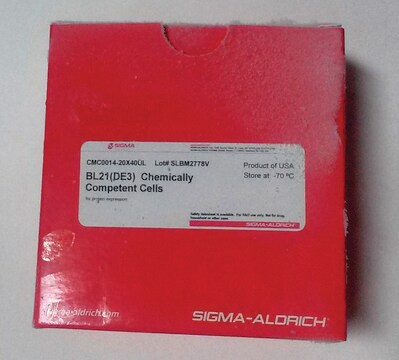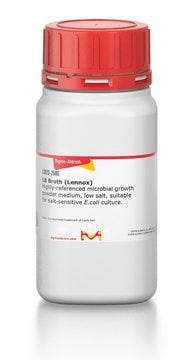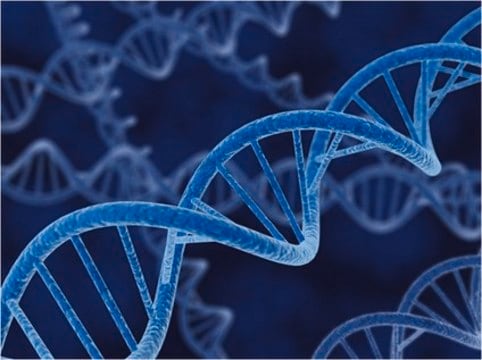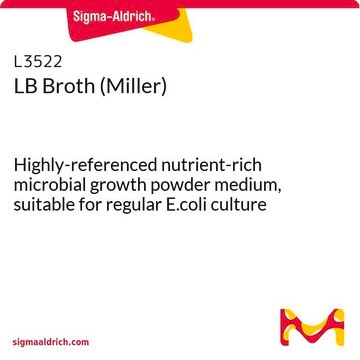추천 제품
product name
OverExpress™ C41(DE3) pLysS Chemically Competent Cells, for the highest protein expression
생물학적 소스
Escherichia coli
Grade
for molecular biology
성장 모드
adherent or suspension
형태학
rod shaped
기술
microbiological culture: suitable
세포 형질전환
competent cell type: chemically competent
transformation efficiency: ≥1 x 106 cfu/μg
배송 상태
dry ice
저장 온도
−70°C
일반 설명
OverExpress™ Electrocompetent and Chemically Competent Cells are E. coli strains that are effective in expressing toxic proteins from all classes of organisms, including eubacteria, yeasts, plants, viruses, and mammals. The effectiveness of these new strains in expressing toxic proteins has been validated in more than 350 publications. The OverExpress™ strains contain genetic mutations phenotypically selected for conferring tolerance to toxic proteins. The strain C41(DE3) was derived from BL21(DE3). This strain has at least one mutation, which prevents cell death associated with expression of many recombinant toxic proteins. The strain C43(DE3) was derived from C41(DE3) by selecting for resistance to a different toxic protein and can express a different set of toxic proteins to C41(DE3). OverExpress C41(DE3)pLysS and C43(DE3)pLysS also carry a chloramphenicol-resistant plasmid that encodes T7 lysozyme, which is a natural inhibitor of T7 RNA polymerase. Cells containing pLysS produce a small amount of T7 lysozyme. These strains are used to suppress basal expression of T7 RNA polymerase prior to induction, thus stabilizing recombinants encoding particularly toxic proteins.
Genotype
F – ompT hsdSB (rB- mB-) gal dcm (DE3) pLysS (CmR)
Genotype
F – ompT hsdSB (rB- mB-) gal dcm (DE3) pLysS (CmR)
특징 및 장점
- Express genes cloned into any T7 vector with these BL21(DE3) derivatives
- Effective in expressing toxic & membrane proteins
- Cited in over 350 research articles
성분
- OverExpress C41(DE3) pLysS chemically competent cells
- pUC 19 transformation control DNA
- recovery medium for expression
법적 정보
OverExpress is a trademark of Imaxio, S.A.
관련 제품
제품 번호
설명
가격
Storage Class Code
10 - Combustible liquids
시험 성적서(COA)
제품의 로트/배치 번호를 입력하여 시험 성적서(COA)을 검색하십시오. 로트 및 배치 번호는 제품 라벨에 있는 ‘로트’ 또는 ‘배치’라는 용어 뒤에서 찾을 수 있습니다.
Myles B C Dillon et al.
ACS chemical biology, 7(7), 1198-1204 (2012-04-18)
Protein arginine methyltransferases (PRMTs) catalyze the posttranslational methylation of arginine using S-adenosylmethionine (SAM) as a methyl-donor. The PRMT family is widely expressed and has been implicated in biological functions such as RNA splicing, transcriptional control, signal transduction, and DNA repair.
Ji-Young Youn et al.
Molecular biology of the cell, 21(17), 3054-3069 (2010-07-09)
BAR domains are protein modules that bind to membranes and promote membrane curvature. One type of BAR domain, the N-BAR domain, contains an additional N-terminal amphipathic helix, which contributes to membrane-binding and bending activities. The only known N-BAR-domain proteins in
Myles B C Dillon et al.
The Journal of biological chemistry, 288(39), 27872-27880 (2013-08-16)
Protein arginine methyltransferase (PRMT) 8 is unique among the PRMTs, as it has a highly restricted tissue expression pattern and an N terminus that contains two automethylation sites and a myristoylation site. PRMTs catalyze the transfer of a methyl group
Neale Harrison et al.
PloS one, 9(11), e113007-e113007 (2014-11-26)
N-acylethanolamines are an important class of lipid signaling molecules found in many species, including the nematode Caenorhabditis elegans (C. elegans) where they are involved in development and adult lifespan. In mammals, the relative activity of the biosynthetic enzyme N-acyl phosphatidylethanolamine-specific
프로토콜
Protocol for OverExpress™ Chemically Competent Cells. Product Numbers: CMC0017, CMC0018, CMC0019, CMC0020, CMC0023, CMC0024
자사의 과학자팀은 생명 과학, 재료 과학, 화학 합성, 크로마토그래피, 분석 및 기타 많은 영역을 포함한 모든 과학 분야에 경험이 있습니다..
고객지원팀으로 연락바랍니다.








